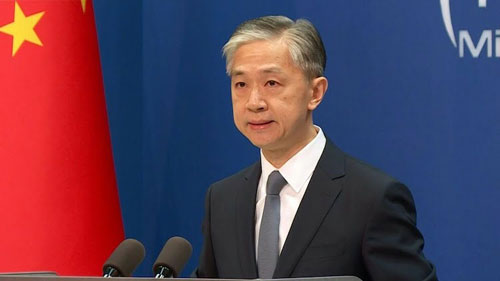Observer Report
Beijing
Some people in the US deliberately choose to ignore the enormous efforts Xinjiang has taken to protect human rights but want only hype up the so-called “forced labour” issue in Xinjiang and slander Xinjiang’s efforts to take good care of the workforce.
This was stated by a spokesperson of Chinese Foreign Ministry Wang Wenbin at a news briefing while responding to criticism by some US officials on issue of forced labour in Xinjiang.
In a detailed statement on the issue, the spokesperson said, “Their groundless and untenable accusations exemplify disinformation and fake news. The State Council Information Office of the People’s Republic of China just released a white paper titled “Employment and Labor Rights in Xinjiang”.
If those people in the US truly care about the employment situation in Xinjiang, I suggest they give a good read to this white paper.
The white paper started by saying that “Work creates the means of existence and is an essential human activity”. It creates a better life and enables all-round human development and the progress of civilization.
The Constitution of the People’s Republic of China provides that all citizens have the right and obligation to work.
To protect the right to work is to safeguard human dignity and human rights. Workers’ job preferences have always served as an important reference for the local government of Xinjiang in expanding employment channels and organizing vocational training sessions.
In accordance with law, Xinjiang guarantees workers’ equal right to employment, remuneration, rest and leisure, occupational safety, social insurance and freedom of religious belief.
In accordance with the principle of equal protection of civil rights, Xinjiang ensures that there is no discrimination against workers on the basis of ethnicity, region, gender, or religious belief, and that no individuals’ rights are restricted because of their urban or rural status, profession or position.
The minimum salary in Xinjiang was raised by 19.74 percent from RMB1,520 per month in 2013 to RMB1,820 per month in 2018, which was at a high level in the country. Workers are guaranteed the right to time off on weekends and statutory holidays including the Spring Festival, Roza Festival (Eid al-Fitr) and Corban Festival (Eid al-Adha), and they can choose which languages to use for communication.
Xinjiang has been firm in preventing and punishing any incidents of forced labor. With the implementation of a series of employment policies and measures, Xinjiang has seen a notable improvement in living standards for all ethnic groups. The annual per capita income of workers from Xinjiang who are working in other provinces is about RMB40,000, and the local people who left their home to work elsewhere in Xinjiang have an annual per capita income of RMB30,000, much higher than earnings from farming.
From 2013 to the end of 2019, the poverty incidence dropped from 19.4 percent to 1.24 percent. From 2014 to the end of 2019, a total of 2.92 million people shook off poverty.—INP










